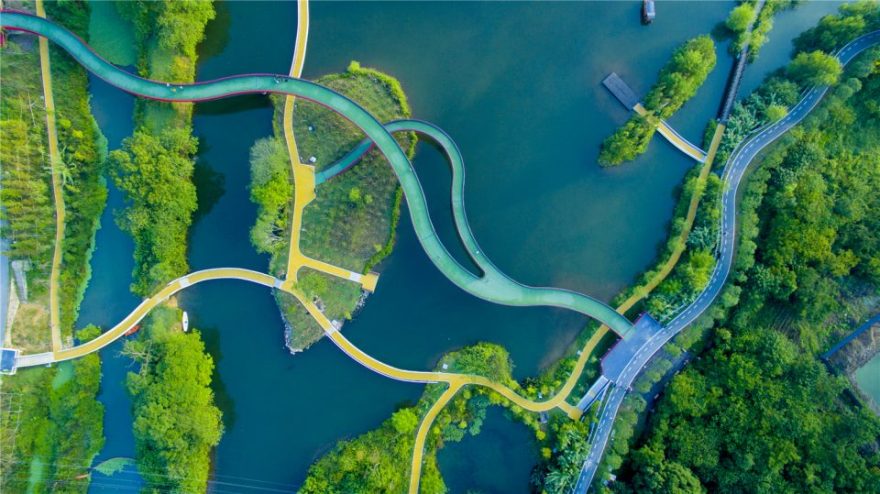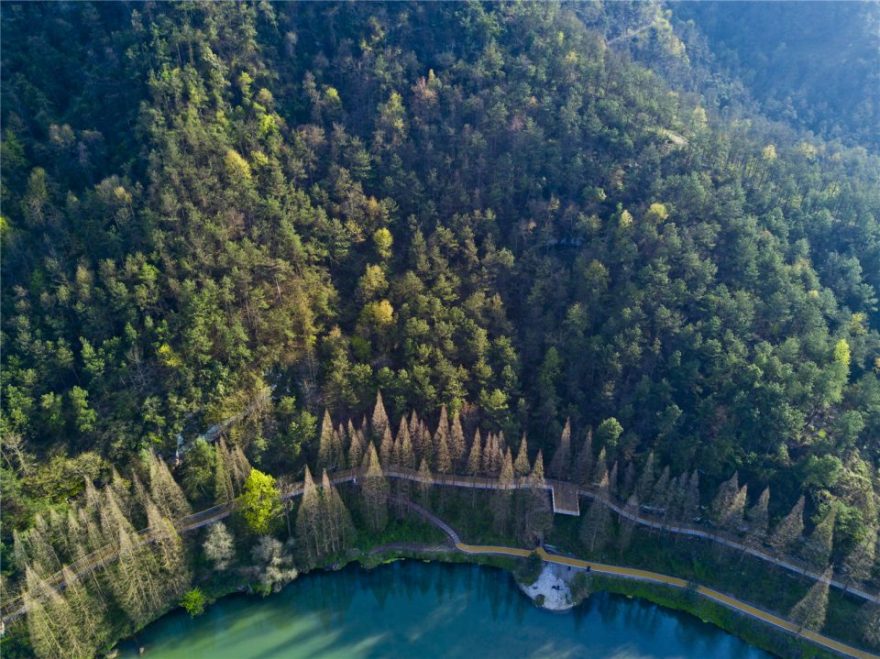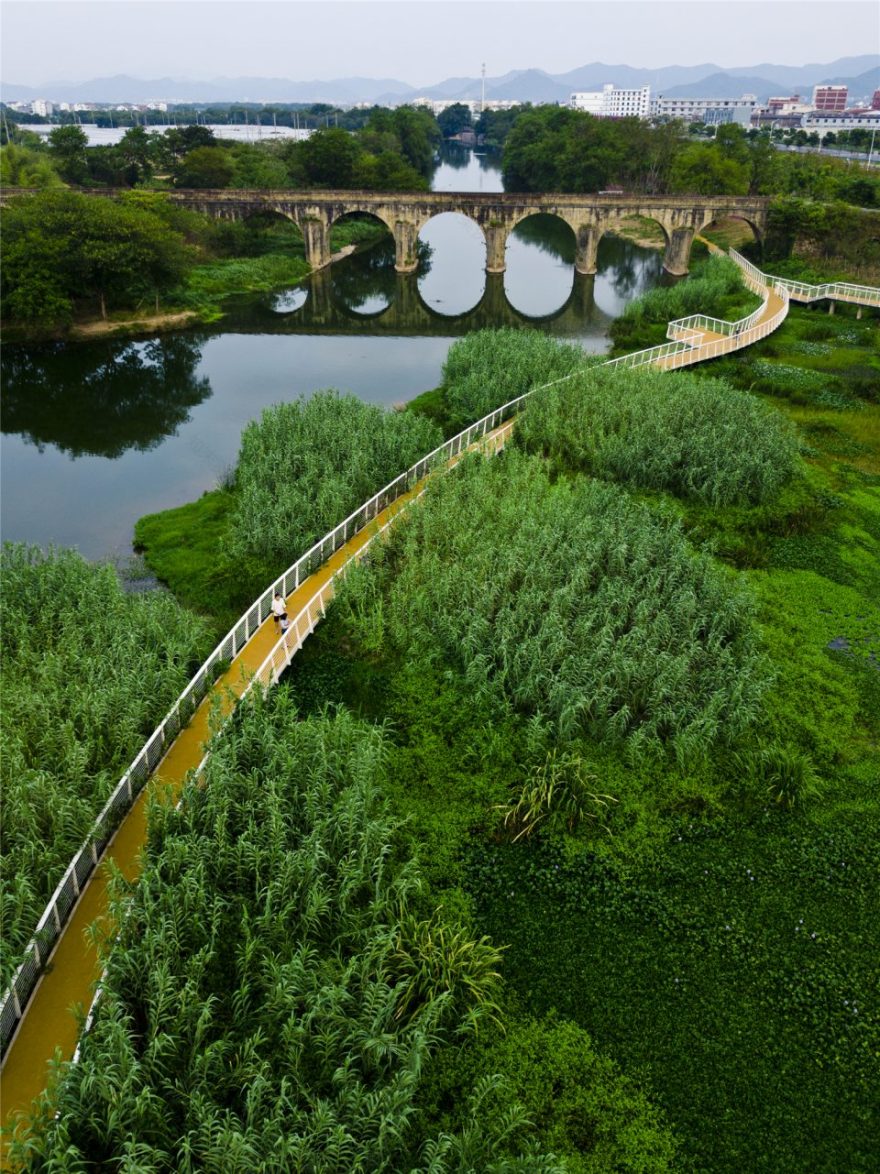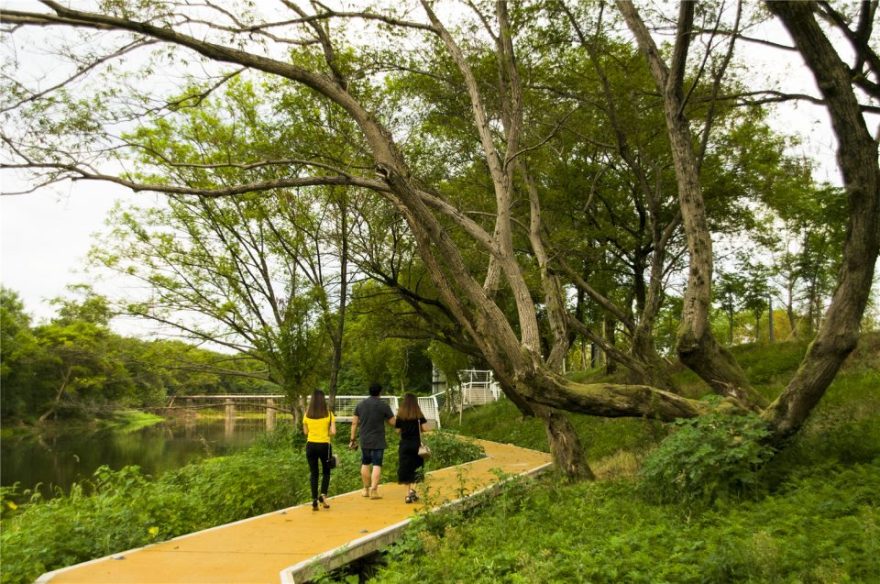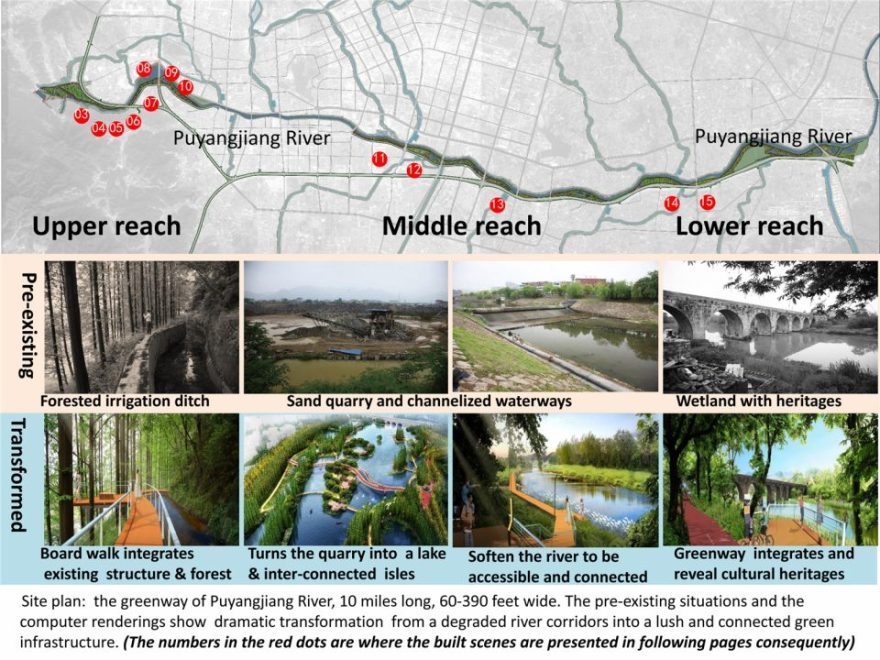查看完整案例


收藏

下载
来自土人设计
Appreciation towards Turenscape for providing the following description:英文说明见最后,English description is showing below
项目简介Project Statement
‘五水共治’是浙江的伟大创造,而浙江的“五水共治”是从治理金华浦江县的母亲河浦阳江开始的。案例通过水生态修复和景观营造拯救了一条曾经被抛弃的母亲河。设计运用了生态水净化、雨洪生态管理、与水为友的适应性设计以及最小干预的景观策略,结合硬化河堤的生态修复、改造利用农业水利设施,并融入安全便捷的慢行交通网络,将过去严重污染的河道彻底转变为最受市民喜爱的生态、生活廊道。设计实践了通过最低成本投入达到综合效益最大化的可能,并为河道生态修复以及河流重新回归城市生活的设计理念提供了宝贵的实际经验。
▼鸟瞰图,aerial view
场地现状与挑战Challenges and Objectives
浦阳江发源于浦江,是钱塘江的重要支流,全长150公里,经诸暨、萧山后汇入钱塘江。浦阳江是浦江县城的母亲河,河流穿城而过。本案例位于浦江县域范围内,长度约17公里,总面积196公顷,宽度为20-130米。设计范围上游段从通济湖水库坝脚至翠湖,下游段从浦江第四中学至义乌溪。
浦江是“中国水晶之都”,鼎盛时期全国80%以上的水晶制品均产自浦江,全县曾经有2.2万家水晶加工作坊,至少有20万人直接从事水晶生产。水晶产业一度给浦江人民带来了巨大的物质财富,但隐藏在繁华背后的却是一个极度“危险”的浦江:荡漾碧波被水晶污水吞噬,加之农业面源污染、畜禽养殖污染、生活污水处理水平落后,水质被严重污染。浦江全县出现了462条“牛奶河”、577条“垃圾河”和25条“黑臭河”,环境满意度调查连续6年全省倒数第一。浦阳江水质连续8年劣五类,成为全省污染最严重的河流。曾经拥有秀美山水的浦江如今生态危机重重,人们赖以生存的自然环境变得满目疮痍。设计面临的最大挑战是如何通过综合有效的生态修复策略,恢复浦阳江的往日生机。
▼场地原貌,existing view
设计策略Design Strategies
a. 湿地净化系统构建及水生态修复策略
在本次研究范围内共有17条支流汇聚到浦阳江,规划提出完善的湿地净化系统截留支流水系,将支流受污染的水体通过加强型人工湿地净化后再排入浦阳江。设计后湿地水域面积约为29.4公顷,以湿地为结构,发挥水体净化功效并提供市民游憩的湿地公园的总面积达166公顷,占生态廊道总面的84%。其中具有较强水体净化功效的大型湿地斑块包括:上游段生态改造的翠湖湿地公园(石马溪)、运动公园湿地净化斑块(黄龙溪)、湖山桥湿地净化斑块(桃源溪)、冯村污水处理厂尾水湿地净化公园、彭村湿地净化斑块(五溪)、第二医院湿地净化斑块(和平溪)以及下游的三江口湿地净化斑块(义乌溪)。各斑块设置在对应支流与浦阳江的交汇处,将原来直接排水入江的方式改变为引水入湿地,增加了水体在湿地中的净化停留时间。同时拓宽的湿地大大加强了河道应对洪水的弹性,精心设计的景观设施将生态基底点石成金,使生态廊道成功融入到人们的日常生活当中。通过水晶产业的整治和转型,结合有效的生态净化系统构建,浦阳江目前的水质得到提升。从连续的劣Ⅴ类水达到现在的地表Ⅲ类水,并且水质逐步趋于稳定。
▼提出完善的湿地净化系统,the sophisticated wetland purification system
b. 与洪水相适应的海绵弹性系统策略
设计运用海绵城市理念,通过增加一系列不同级别的滞留湿地来缓解洪水的压力。据统计,实施完成的滞留湿地增加蓄水量约290万m3,按照可淹没50cm设计计算则可增加蓄洪量约150万m3,一方面这大大降低了河道及周边场地的洪涝压力,另外一方面这部分蓄存的水体资源也可以在旱季补充地下水,以及作为植被浇灌和景观环境用水。原本硬化的河道堤岸被生态化改造,经过改造的河堤长度超过3400米。硬化的堤面首先被破碎并种植深根性的乔木和地被,废弃的混泥土块就地做抛石护坡,实现材料的废物再利用。迎水面的平台和栈道均选用耐水冲刷和抗腐蚀性的材料,包括彩色透水混凝土和部分石材。滨水栈道选用架空式构造设计,尽量减少对河道行洪功能的阻碍同时又能满足两栖类生物的栖息和自由迁移。
▼硬化的堤岸被生态化改造,the hard river wall is ecological reconstructed
c. 低投入,低维护的景观最小干预策略
浦阳江两岸枫杨林茂密,设计采用最小投入的低干预景观策略最大限度地保留了这些乡土植被,结合廊道周边用地情况以及未来使用人流的分析采用针灸式的景观介入手法,充分结合场地良好的自然风貌将人工景观巧妙地融入自然当中。设计长度约25公里的自行车道系统大部分利用了原有堤顶道路,以减少对堤上植被造成破坏;所有步行栈道都由设计师在现场定位完成,力求保留滩地上的每一棵枫杨,并与之呼应形成一种灵动的景观游憩体验。新设计的植被群落严格选取当地的乡土品种,乔木类包括枫杨、水杉、落羽杉、杨树、乌桕、湿地松、黄山栾树、无患子、榉树等。并选用部分当地果树包括:杨梅、柿子树、樱桃、枇杷、桃树、梨树和果桑等。地被主要选择生命力旺盛并有巩固河堤功效的草本植被,包括西叶芒、九节芒、芦苇、芦竹、狼尾草、蒲苇、麦冬、吉祥草、水葱、再力花、千屈菜、荷花;以及价格低廉、易维护的撒播野花组合。
▼人工景观巧妙植入自然中,insert themanufactured Landscapes into the nature
▼景观设计注意对树木的避让,the palce of the landscape take much care of the existing trees
d.水利遗迹保护与再利用策略
场地内现存大量水利灌溉设施,包括浦阳江上7处堰坝、8组灌溉泵房以及一组具有鲜明时代特色的引水灌溉渠和跨江渡槽。设计保留并改造了这些水利设施,通过巧妙的设计在保留传统功能的前提下转变为宜人的游憩设施。经过对渡槽的安全评估以及结构优化,设计将其与步行桥梁结合起来,并通过对凿山而建的引水渠的改造形成连续、别具一格的水利遗产体验廊道。该体验廊道建成后长度约1.3公里,是最小干预设计手法运用的成功体现。设计通过在原有渠道基础上架设轻巧的钢结构龙骨并铺设了宜人的防腐木铺装,通透的安全栏杆和外挑的观景平台与场地上高耸的水杉林相得益彰。被保留的堰坝和泵房经过简单修饰成为场地中景观视线的焦点,新设计的栈道与其遥相呼应形成该案例中特有的新乡土景观。通过运用保护与再利用的设计策略,本案例留住了乡愁记忆,也保留了场地上的时代烙印,让人们在休闲游憩的同时感受艺术与教育的价值意义。
▼提供市民活动场所,places for citizens
水利遗产体验廊道,the corridor above the water
▼景观规划策略,the concept and strategy
English descriptionProject Statement
A degraded 10 mile long river corridor, covering an area of 484 acres is ecologically recovered and transformed into a lush and high performing greenway that reconnects human beings with nature. This heals the physical and mental damage done to the local community, who have suffered the degraded environment for decades due to relentless development.
Challenges and Objectives
Pujiang, a small city located in East China dominated by a monsoon climate, has a population of 100,000plus another 400,000 living in its vicinity. It occupies a small and productive basin which the River Puyangjiang runs through. For almost two thousand years, the city and its agricultural vicinity lived in an Edenic paradise. Such calm and harmony has been broken by the ruthless and rapid industrialization and urbanization in the past four decades: the Puyangjiang River and its tributaries were heavily polluted, water courses were channelized, and river beds were turned into sand quarries. The river became a backyard dump and people turned back from it. The river that used to be the pride and unifying tie of the community had become foe associated with ugliness, foul smells, and danger. As a matter of fact, it was listed as the worst case in the provincial region and ended up giving the city an unfamed identity. Beginning in early 2014, the local government launched a campaign to improve the overall living environment of the city and Puyangjian River was taken as a pilot project setting up a model for the city and the provincial region as a whole. Through competition, the landscape architect was selected and commissioned to transform the degraded river corridor into a greenway, with clean water, healthy ecology, and an active corridor for daily recreational uses that connects the community and brings back the beauty and dignity of their mother river.
Design Strategies
Three strategies are taken to transform the degraded river corridors.
Firstly, softening and remediating. While the sewage from the city and factories have been piped into water treatment plants, the nastier problem is the polluted surface flow, largely caused by over used chemical fertilizers in the farm fields. The river was largely channeled with concrete and hard surfaces, and has lost its resiliency to water and lost its capacity for self-cleansing. The design removes the concrete of the river bank, recovers the riparian plains on both sides of the river and turns them into Green Sponges, which are designed to be flood adaptive, able to catch and remediate the surface flows from the agricultural fields and build areas biologically; Ecological buffers are designed so that the river water can be diverted, slowed down and cleansed.
Secondly, preserving and integrating. All existing vegetation along the river, notably the Dawn Redwood (Metasequoia glyptostroboides) grove at the upper reach of the river, and the Wingnut Trees (Pterocarya stenoptera) along the middle and lower reaches of the river, are all well protected and integrated with the designed vegetation. Cultural heritages and existing structures such as bridges, aqueducts, and water locks were all well preserved and integrated with the new design of paths and platforms, so that the memory of the past can be kept. Thirdly, connecting and activating. Winding pedestrian and bike paths and boardwalks are built along both banks of the river; Bridges are built across the river to connect communities at both sides of the river; Resting platforms and gathering places are built to activate the greenway; An environmental interpretation system is designed to tell the natural and cultural stories of the river corridor.
As a result, in just three years, the mother river was cleansed and people come to swim and bathe in the river as they did when they were kids decades ago; The concrete river bank has largely been softened and native vegetation recovered, with frogs and birds coming back and making their homes here again; Continuous pedestrian and bike paths allow the newly urbanized residents to jog and ride in the morning and evening or have a leisure weekend family gathering. The beauty and dignity of the mother river has been restored, in addition to a modern and fresh face featured with contemporary landscape design, and has attracted tens of thousands of visitors every day.
五水共治:浦阳江生态廊道
项目信息
项目地点:中国 浦江县
项目类别:海绵城市
项目规模:196公顷
设计时间:2014-6-建成时间:2016-12-委托方:浦江县住建局
Project Location:Pujiang County, Zhejiang ,China
Project Classify:Greenway
Project Scale:10 mile long, 485 Acers
Design Time: 2014-06Built time: 2016-12
Client:Pujiang County Government
客服
消息
收藏
下载
最近



